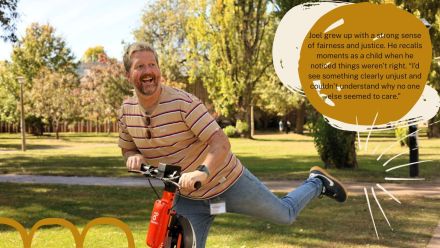What do our climate refugees look like?
By Kierra-Jade Maciver
When the bushfires hit the town of Drake in NSW, Rod Simpson says he became one of Australia's first climate refugees. He's travelled across States, and the Tasman waters in search of a place to settle. More than a year on, he's still searching.
A small business owner and animal conservationist, Rod has a passion for wildlife rescue and supporting the community. His off-the-grid property provided the perfect habitat for the countless animals he's rescued. And it's no surprise that even after losing his property to the fires, he was at the coalface caring for the animals and manning a local support centre for the affected community.
"Caring for animals is the only way I've ever made sense of my life. It's usually wombats, koalas and horses... mostly orphaned or injured by cars," Rod said.
Rod is a resilient individual with his fair share of challenges that he is bravely overcoming, but there is a side to this story which is often untold, and it's for this reason that Rod has offered to share his story.
"I was once a counsellor so I know what works, but what used to work doesn't work for me anymore. Sure, I was a little damaged prior to the fires but losing your sense of home and place and the trauma of what I saw and had to do to survive the fires, particularly for the animals, it stays with you," he says.
"I stood there staring at the Long Gully mountain, the whole thing was just aglow. I was surrounded by fire in three directions, and was the first to lose my home that night.
"At one point it was so hot I felt like I was actually cooking and someone explained to me afterwards that I probably was.The temperatures were so hot that when the leaves of the Eucalypts disintegrate the oil is left suspended in the air like a fine mist. The oil was all over us. I found comfort in that though. When I felt overwhelmed, I'd stroke my beard for the scent of the Eucalypt."
Rod's story is inspiring, although it is just one of thousands who were affected by the bushfires. The 'Black Summer' bushfires of late 2019 and 2020 are one of the most severe bushfire seasons in recorded history, with 2,400 homes destroyed in NSW alone, and displacing thousands more, many of whom are still seeking refuge and grappling with the impacts, both visible and invisible.
Researchers from The Australian National University (ANU) say individuals, families and communities affected by bushfire and smoke exposure experience significant distress as a result of danger, evacuation, displacement and loss - of life, property, livelihood. They are also at increased risk of acute and long-term psychological and behavioural health problems.
Experts are calling for an urgent need to address evidence gaps relating to key risk factors for psychological ill-health. ANU researchers are tackling this in a nationwide survey on the impacts of bushfire on health and wellbeing.
ANU Researcher and Clinical Pscyhologist, Dr Emily Macloed said bushfires impact the health and wellbeing of people in many ways, and the impacts can last for years.
"Experts agree that bushfire threat is increasing. We are trying to identify the factors that help people and communities be prepared for and resilient to future bushfires. The results will be used to shape strategies to support individuals and communities in the face of future bushfires, and improve patient care," she said.
Social connectedness and community resilience are important in facilitating recovery from natural disaster; however, dramatic changes to the environment and social landscape following bushfires mean that community structures may become fragmented or displaced.
Rod says: "One of the hardest things was not having connections and support. I lived alone and had no friends or family there. It's always been me, the animals, and for a while, my partner. At the Lunatic pub where we'd gather each morning, you'd hear the catchcry go and be with your family, go and be with your friends, or leave the area if you have somewhere to go. That's something I felt I didn't have.
"Someone labelled me Australia's first climate refugee," says Rod.
"I don't know if that's true but I wear it with pride. Since the fires, I've moved around a bit. I've tried to settle and build my business. I bought a place in St Helens in Tasmania, but I'm not sure now if that's where I'll stay."
Associate Professor Tegan Cruwys, from the ANU Research School of Psychology, says that a large part of the answer to loneliness lies in feeling connected to a community.
"It doesn't have to be neighbours - it can be belonging to your family or your workplace. What is most important is that people feel a sense of belonging," she said.
Rod says: "I would say loneliness is the difference between me being the way I am now and fully functional in society.
"There's a thing called climate grief - I have it, and it's not really being discussed. Life has gone on and it's all business as usual but people like me, we're still here. We're still living it everyday."
Experts say in a warming continent, more fires will start, and there is much to be done to prevent and respond to the fires and the needs of those affected.
As a self-confessed man of the land Rod feels strongly about the grave impact that climate change is having.
"We're not actually asking the questions we need to be asking. We need to have an honest conversation about the problems we face, climate change, its impacts, and what we can do to help mitigate it," he said.
The ANU researchers are seeking perspectives from all Australians to support this important research into bushfire impacts on health and wellbeing, affected and unaffected.
"We are very grateful for Rod and others that have already participated in the survey," Emily said.
"Our approach is sensitive and respectful to the experiences of affected people and communities, and the responses will offer important insights and contribute to an important conversation."
You can complete the survey here https://bit.ly/3bqxmCV.


